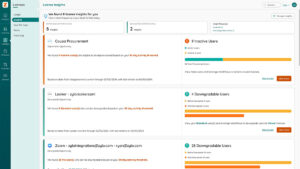
Guide to SaaS Compliance Software—Tools, Risks & Best Practices
Table of Contents ToggleWhat Is SaaS Compliance?Why SaaS Compliance MattersKey Types...
Back
Back
Search for Keywords...
Blog

Table of Contents
With the sheer mass of information available online, it’s no wonder that cloud-first organizations are growing in popularity. Cloud-based organizations utilize Cloud and SaaS software across their entire business, or over large sectors of it. Chief Information Officers (CIOs) at these organizations are balancing many responsibilities including corporate revenue growth, simplifying IT, reducing spending, and leading innovation.
The tumultuous last few years, riddled with a global pandemic and economic uncertainty, have led to a shift in priorities for CIOs. According to the 2024 State of the CIO Report, CIOs are increasingly spending more time on security, financial risk, and operational efficiency, including:
As a result of the changing global economy, 78% of heads of IT say the CIO role was elevated and this visibility within the organization is expected to continue. Tech budgets continue to grow, with 54% of CIOs expecting their budget to increase or remain the same.
CIOs are under more pressure than ever before. Gordin Atkin, VP of Technology and Business Platform at Salsify expressed this struggle on SaaSMe Unfiltered, stating, “In my opinion, being the CIO is the hardest job at a company because you have to understand in depth everything across the business in order to support the business properly, and I don’t know of any other organization that supports the business as deeply as an IT organization does.”
It’s clear CIOs need to adopt a SaaS Management practice and platform to make their jobs easier and maximize their impact on the organizations.
Chief Information Officers need ultimate visibility into Cloud spend and usage to make the best decisions for the organization. Along similar lines lie the issues of managing these applications. Gaining visibility is certainly the first step in building a strong foundation. But even with visibility into all facets of subscription software internally, ongoing and complete discovery is foundational. The best SaaS Management platform (SMP) will uncover everything and allow you to keep track of discoveries.
SMPs like Zylo’s Discovery Engine give CIOs exclusive access to actionable SaaS Management insights. Build a system of record, boost operational efficiency, meet business users’ needs, mitigate compliance risks, and see how you stack up and reconcile portfolios in M&A, all in one convenient place. Without a SaaS Management platform, CIOs fall victim to the following operational hazards.
How the Zylo Discovery Engine Powers the Most Comprehensive SaaS Management Platform
Learn MoreWith cybersecurity being the focus of 70% of CIOs, the dangers posed by shadow IT and employee purchases bypassing security reviews are real and avoidable with the help of SMPs. Now, with artificial intelligence use rapidly increasing, there are additional AI data security concerns to think about.
SaaS Management platforms mitigate compliance and security risks, elevate policies, and control SaaS sprawl. Zylo’s latest Security Detail feature allows you to see exactly who owns your existing SaaS applications, assess any associated risks, and stop dangerous data breaches before they start.
Zylo does this by finding and recording up-to-date security certifications that are buried on each of your SaaS applications websites. This is work that would take hours but is available in minutes at your fingertips.
Because ownership of SaaS is decentralized across the business, complete oversight becomes impossible. Zylo’s 2025 SaaS Management Index shows that IT continues to own less SaaS spend and manage fewer of an organization’s applications. Specifically, IT owns 26% of SaaS spending and 16% of all SaaS applications.
A SaaS Management platform helps you to uncover all your SaaS, and create a system of record that becomes the single source of truth for your team. This truth brings you one step closer to your visibility, cybersecurity, and data privacy and analysis goals.
As a CIO, it’s important to understand your SaaS landscape so you can maximize your investments in those applications. However, without a SaaS Management platform, Chief Information Officers only have part of the picture. Often, there are gaps in knowledge of:
This shortsightedness can lead to application redundancy and inefficiency, which wastes money that could be better optimized elsewhere. This further damages your employee experience. Redundancy reduces effective collaboration and makes it more challenging to find the tools you need.
SaaS Management platforms boost operational efficiency and maximize usage while meeting business users’ needs and empowering effectiveness. Optimize your SaaS portfolio to support more productivity in the future.
Without comprehensive oversight of your organization’s spending habits, it is impossible to strategically manage your budget, find waste, and cut costs. The average company wastes $21M on unused SaaS licenses annually, according to Zylo’s 2025 SaaS Management Index.
SaaS Management platforms help CIOs understand where expenditures are coming from and identify opportunities to find and cut wasteful spending. Zylo’s App Overview and Insights help organizations to catch duplicate applications or redundant applications, streamlining their fleet to use funds more efficiently.

With full visibility into their organization’s Cloud apps, CIOs have the opportunity to radically reshape their organizations.
Chief Information Officers have no shortage of responsibilities, from helping the organization reach revenue growth targets to simplifying IT to leading product innovation and finally reducing spend. Add in the headwinds of a global pandemic and economic slowdown, plus a renewed focus on security, data, and customers, and it’s easy to be overwhelmed by the sheer weight of it all.

Enter a SaaS Management platform. While there’s a lot of emphasis on the importance of visibility created by a SMP, that’s just the first battle. The second part is using data to inform your decisions. What does this type of platform actually do to help the CIO better manage SaaS and cloud applications?
Let’s examine a few components:
Executive Dashboard: Having all provider-specific data in one single platform, versus many siloed platforms, CIOs can see Cloud metrics alongside spend and application trending detail to make data-driven decisions. Understanding your adoption and utilization rates, and optimization opportunities, allows you to maximize efficiency and your financial investments.
Renewals: With proactive visibility and alerting, as well as application level data ownership, CIOs are in a much better position to negotiate and get the best contract terms available. A SMP makes it possible to operationalize your renewal management so that you have complete coverage and make informed decisions.
Supplier Relationships: Effectively managing supplier relationships is now possible when the contact information, quotes, contracts, and notes about the relationship are stored with the current contract spend and application utilization information. The days of asking a provider to share utilization details to negotiate a deal with that same provider are over. Having access to benchmarking data within that same platform gives you important leverage to get the right price for your software.
Interested in Zylo for CIOs? Request a demo and start getting more out of your SaaS applications.

Table of Contents ToggleWhat Is SaaS Compliance?Why SaaS Compliance MattersKey Types...

Table of Contents ToggleCIO Effectiveness Begins with VisibilitySecurity and Compliance Risks...

Table of Contents ToggleCIO Effectiveness Begins with VisibilitySecurity and Compliance Risks...

Table of Contents ToggleCIO Effectiveness Begins with VisibilitySecurity and Compliance Risks...
| Cookie | Duration | Description |
|---|---|---|
| cookielawinfo-checkbox-analytics | 11 months | This cookie is set by GDPR Cookie Consent plugin. The cookie is used to store the user consent for the cookies in the category "Analytics". |
| cookielawinfo-checkbox-functional | 11 months | The cookie is set by GDPR cookie consent to record the user consent for the cookies in the category "Functional". |
| cookielawinfo-checkbox-necessary | 11 months | This cookie is set by GDPR Cookie Consent plugin. The cookies is used to store the user consent for the cookies in the category "Necessary". |
| cookielawinfo-checkbox-others | 11 months | This cookie is set by GDPR Cookie Consent plugin. The cookie is used to store the user consent for the cookies in the category "Other. |
| cookielawinfo-checkbox-performance | 11 months | This cookie is set by GDPR Cookie Consent plugin. The cookie is used to store the user consent for the cookies in the category "Performance". |
| viewed_cookie_policy | 11 months | The cookie is set by the GDPR Cookie Consent plugin and is used to store whether or not user has consented to the use of cookies. It does not store any personal data. |